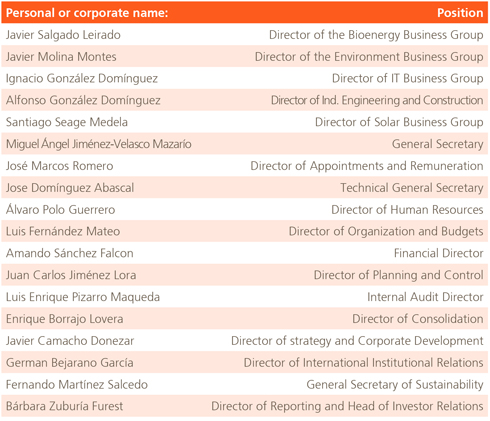 Abengoa
Abengoa
Annual Report 2010
- Corporate Governance
- Annual Report on Corporate Governance
- Structure of the Company’s Governing Bodies
B - Structure of the company’s governing bodies
B.1 Board of Directors
B.1.1 Indicate the maximum and minimum number of directors stipulated in the company Bylaws:

B.1.2 Complete the following table on the members of the Board of Directors:
Identify any members who left the Board of Directors over the period:
Mr. Miguel Martín Fernández, dated 25th October 2010.
B.1.3 Complete the following tables on the different types of members of the board:
Executive directors

total number of Board members 3
total % of Board 20%
Independent External Directors
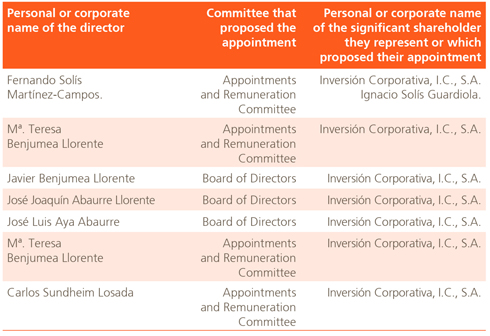
total number of proprietary directors 7
% of total Board of Directors 46.667
Independent external directors
Personal or corporate name of the director: Prof. Alicia Velarde Valiente
Profile: Independent
She was born in Madrid on 28th October 1964 and studied at ICE Pablo VI from where she graduated with Magna Cum Laude. Law Degree from San Pablo University Studies Centre (Universidad Complutense) obtaining 21 distinctions (A+), 3 As and 1 A-. In 1990 she passed the Notary exams and became a Notary Public. During the 1994-1995 academic years she taught Civil Law at Universidad Francisco de Vitoria, where she remained until 1999. She is still connected with this University where from 1999 to the present, she teaches Master Lectures in the Masters in Canon Law, under the Directorship of Mr. José Mª Iglesias Altuna.
Personal or corporate name of the director: Prof. Carlos Sebastián Gascón
Profile: Independent
Mr Gascón (born in Madrid in 1944) studied at the universities of Madrid, Essex (UK) and the London School of Economics. He has been professor of Introduction to Economic Analysis at Madrid’s Universidad Complutense since 1984. Outside his academic life, he has served as Director General for Planning attached to the Spanish Ministry of the Economy, director of the Fundación de Estudios de Economía Aplicada (FEDEA) and consultant and director of various private companies. He currently sits on the boards of Abengoa, S.A., Abengoa Bioenergía, S.A. and Gesif, S.A. He is likewise a member of the Boards of Trustee of Fundación Real Madrid and of the Scientific Committee of Fundación de Estudios Financieros. He has written many articles and papers on macroeconomics, the workplace, economic growth and the institutional economy and is also a regular columnist for the Cinco Días economic newspaper.
Personal or corporate name of the director: Prof. Daniel Villalba Vilá
Profile: Independent
Daniel Villalba is Professor of Business Economics at the Universidad Autónoma de Madrid, PhD in Economics by the Universidad Autónoma de Madrid and Master of Science in Operations Research by the Stanford University. He has been CEO of Inverban (a broker and investment bank), member of the Board of Directors at the Madrid Stock Exchange (actually BME) and CEO or member of the board of directors of several non public companies and member of the Board of Directors of Vueling S.A. He also has written more than fifty academic papers and books
Personal or corporate name of the director: Prof. Mercedes Gracia Díez
Profile: Independent
Professor of Econometrics at Madrid’s Universidad Complutense and at Centro Universitario de Estudios Financieros. She has had her scientific work published in the Journal of Business and Economic Statistics, Review of Labor Economics and Industrial Relations, Applied Economics and the Journal of Systems and Information Technology. Director of Balance Sheet Management at Caja Madrid (1996-1999). Head of the Economics and Law Division of the Agencia Nacional de Evaluación y Prospectiva (1993-1996).
Personal or corporate name of the director: Prof. José Borrell Fontelles
Profile: Independent
Mr Borrell Fontelles (born 24/04/1947) is professor of Introduction to Economic Analysis at Madrid’s Universidad Complutense and is to be the next Chairman of the European University Institute in Florence. He studied aeronautic engineering at the Universidad Politécnica in Madrid, and also holds a doctorate in Economic Sciences, a master’s degree in Operations Research from Stanford and a further master’s from Paris’ Institut Français du Pétrole. He worked as an engineer at Compañia Española de Petróleos (1972-1981) and, between 1982 and 1996, he served successively as Secretary General for Budget, Secretary of State for Finance and Minister for Public Works, Telecommunications, Transport and the Environment. He was Chairperson of the European Parliament over the first half of the 2004-2009 legislative term and Chairperson of the Development Assistance Committee over the second.
total number of independent directors 5
% of total Board of Directors 33.3%
The Audit Committee and the Appointment and Remunerations Committee were formed on 2nd December 2002 and on 24th February 2003, respectively. On the same date, the Board of Administration prepared a proposal to modify the Bylaws for the purpose of incorporating the forecasts relating to the Audit Committee, the proposal of the Regulations on the development of Shareholders Assemblies, the partial modifications to the Regulations of the Board of Administration and, finally, the Regulations on the internal system of the Audit Committee and of the Appointment and Remunerations Committee, approved by the General Assembly on 29th June 2003.
In February 2004 the composition of both commissions was modified for the purpose of permitting independent board members from outside the Company to become members of those commissions. Consequently, the Audit Committee and the Appointment and Remunerations Committee were now made up of board members, all of whom were non-executive and most of whom were independent, in accordance with what is established in the Financial System Reform Law. As a result, the first two independent board members were appointed by the Board of Administration since there was still, logically, no appointment committee. Said independence is also ratified on annual basis by the Appointment Commission. Upon its forming, the proposal for the appointment of board members became part of its competence, and since then the aforementioned commission has been the one making the proposals to the Board of Administration
Other external directors
None.
Explain the reasons for why these cannot be considered independent or proprietary directors and detail their connections with the company, its executives or its shareholders.
Not applicable.
Detail any changes in the classification of directors that may have taken place over the year:
No changes occurred in the type of board member. From 25/10/2010 onwards the number of board members rose to three following the appointment of Mr. Manuel Sánchez Ortega as CEO to share the executive duties of the company with Mr. Felipe Benjumea Llorente.
B.1.4 Explain, where applicable, the reasons for why proprietary directors have been appointed at the request of shareholders whose stake amounts to less than 5% of the share capital.
Not applicable.
Detail any failure to address formal requests for board representation made by shareholders whose stake equals or exceeds that of others at whose request proprietary directors have been appointed. If so, explain why the request was not entertained.
Not applicable.
B.1.5 Indicate whether any director has left their post before the end of their term of office, whether they explained their reasons to the Board and by which means and, if this was served in writing to the entire Board, explain the reasons given as a bare minimum:
Following the resignation of Mr. Miguel Martín Fernández as Board Member due to the increase in his other professional responsibilities, and on the proposal of the Appointments and Remunerations Committee dated 25th October 2010, Mr. Manuel Sanchez Ortega was appointed CEO by co-optation for a four-year term.
B.1.6 Indicate, if applicable, the powers vested in any Chief Executive Officers:
All CEO-related faculties are vested in Messrs. Manuel Sánchez Ortega and Felipe Benjumea Llorente. A General Power of Attorney has been conferred upon Mr. José Terceiro.
B.1.7 Identify, where applicable, any Board members who hold administrative or executive posts in other companies that belong to the same business group as the listed company subject to this report:
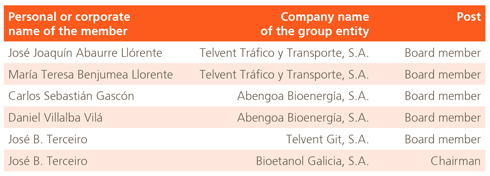
B.1.8 Provide details, where applicable, of any company Board members who also sit on the boards of other entities that do not belong to the same business group and are listed on official securities markets in Spain, insofar as these are known by the company:
B.1.9 Indicate whether the company has established rules on the number of Boards on which its own Board members may sit. If so, provide details:
No
B.1.10 In relation to recommendation number 8 of the Unified Code, indicate the company’s general strategies and policies that must be approved by plenary session of the Board of Directors:
Investment and financing policy.
Yes
Definition of the structure of the business group.
Yes
Corporate governance policy.
Yes
Corporate social responsibility policy.
Yes
Strategic or Business Plan, as well as the budget and management targets.
Yes
The remuneration and performance assessment policy for senior executives.
Yes
Risk control and management policy, as well as the periodic monitoring of internal information and control systems.
Yes
Dividends and treasury stock policy and, in particular, limits thereto. Yes
B.1.11 Complete the following tables on the aggregate remuneration of Board members accrued over the financial year:
a) For the company covered by this report:
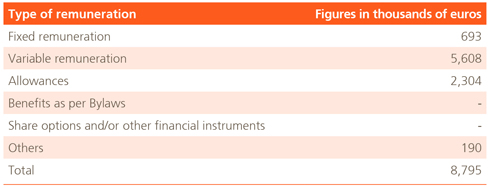
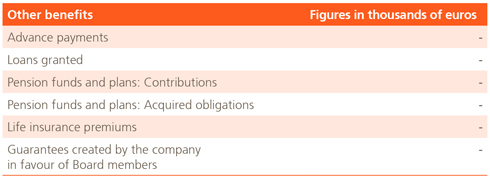
b) Remuneration payable to members of the company’s Board of Directors due to positions held on other Boards of Directors and/or within the senior management of other group companies:
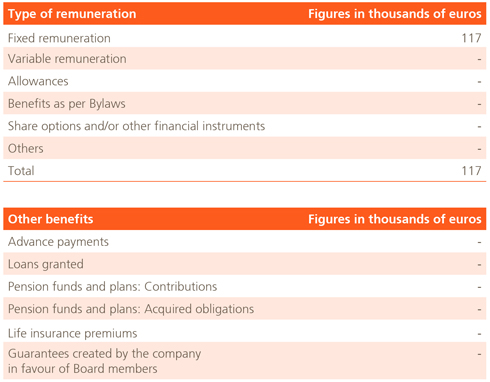
c) Ttotal remuneration by type of director:

d) Profit attributed to the parent company:

B.1.12 Identity any members of the senior management that are not in turn executive directors, and indicate the total remuneration payable thereto during the financial year:
Total remuneration paid to the senior management (in thousand Euros): 7,216
B.1.13 Identify, on an aggregate basis, whether members of the company’s or group’s senior management team, including executive directors, are afforded guarantees or golden parachute clauses in the event of dismissal or changes of control. Indicate whether these contracts must be communicated to, and/or approved by the governing bodies of the company or its group:
There are no contracts or lists of the indicated. Whatever the case may be it is the competence of the Board of Administration upon the proposal of the Appointment and Remunerations Committee, which, as already indicated, has not yet been exercised
B.1.14 Describe the process for establishing the remuneration of Board members and the relevant provisions of the Bylaws.
Process for establishing the remuneration of Board members and relevant Bylaws
Established by the Appointments and Remuneration Committee, Art. 39 of the Bylaws, Remuneration Policy Report for company directors presented to the General Shareholders’ Meeting.
Indicate whether the following decisions must be approved by plenary session of the Board:
Following a proposal from the company’s chief executive, the appointment and removal of senior executives, including their compensation clauses.
Yes
The remuneration of Board members and, in the case of executive ones, the additional remuneration for their executive functions and other conditions set forth in their contracts.
Yes
B.1.15 Indicate whether the Board of Directors approves a detailed remuneration policy and explain the matters covered therein:
Amount of fixed remuneration items, including a breakdown, where applicable, of allowances for participation on the Board and its committees and an estimation of the annual fixed remuneration to which they give rise.
Yes
Variable remuneration items.
Yes
Main characteristics of the benefits system, with an estimation of their annual amount or equivalent cost.
Yes
Conditions that must be contained within the contracts of those who perform senior management functions as executive directors.
Yes
B.1.16 Indicate whether the Board submits a report on the directors’ remuneration policy to the advisory vote of the General Shareholders’ Meeting, as a separate item on the agenda. If so, explain those aspects of the report concerning the remuneration policy as approved by the Board for forthcoming years, the most significant departures in such policies compared to that applied during the financial year in question and an overall summary of how the remuneration policy was applied over the financial year in question. Outline the role played by the Remuneration Committee and, if external consultancy was sought, the identity of the external consultants that provided it.
Yes
The 2010 financial year Appointments and Remunerations Committee issued reports on:
The follow-up and evolution of remunerations of the members of the Board of Directors and the company’s top management.
The proposal of remunerations for the members of the Board of Directors and the company’s top management.
The preparation of the relevant information to be included in the financial statement.
The proposal to the Board of Directors for the co-optation appointment of board member Mr. Manuel Sáanchez Ortega, following the resignation of Mr. Miguel Martín Fernández
The proposal to the Board of Directors to be submitted to the next Shareholders’ General Assembly, to ratify the previous appointment of Mr. Manuel Sánchez Ortega as CEO, by co-optation.
The proposal to the Board of Directors for the approval of the annual report on the Policy of Remuneration of Administrators.
The report verifying adherence to the conditions entailed in the appointment of board members and their characteristics and type.
The proposal to the Board of Directors reporting on the remuneration of the members of the board of directors and the Chief Executive.
Reports on salary comparison and market researches by independent experts.
Issues covered in the remuneration policy report
Amount of fixed remuneration and variable remuneration items.
Role played by the Remuneration Committee
Preparation of the proposal to the Board, stating grounds.
Did the company seek external consultancy?
Yes
Identity of external consultants
Three independent external consultancy firms.
B.1.17 Indicate, if applicable, the identity of those Board members that are also members of the Board of Directors, executives or employees of companies that hold significant shareholdings in the listed company and/or in entities belonging to its business group:
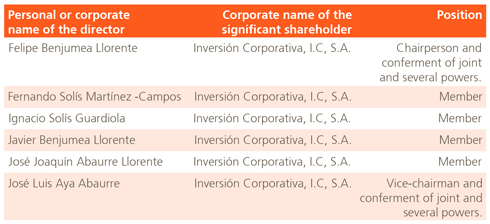
Provide details, where applicable, of any relevant relations others than those contemplated in the previous section, between members of the Board of Directors and significant shareholders and/or group entities:
Personal or corporate name of the Board member
Felipe Benjumea Llorente
Personal or corporate name of the significant shareholder
Finarpisa, S.A.
Description of the relationship
Chairman of the Board.
B.1.18 Indicate whether any amendments were made to the Regulations of the Board of Directors during the financial year:
No
B.1.19 Indicate the procedures for the appointment, reappointment, appraisal and removal of Board members. Provide details of the competent bodies, the processes to be followed and the criteria employed in each of the procedures.
The Appointments and Remuneration Committee is the competent body in all cases and provides the Board of Directors with its duly substantiated proposal, applying the criteria of independence and professionalism as established in the regulations governing the Board and the Committee itself.
The performance of the board members and of the executive board members is evaluated on the proposal of the Appointments Commission through a reasoned report filed to the Board during its first meeting of the following quarter, after the closing of the previous exercise and upon obtaining or at least knowing the estimate of the accounts closure for the exercise and receiving the report from the auditor, which are essential as evaluation criteria.
B.1.20 Indicate the cases in which Board members are obliged to resign.
Directors are removed from office when the term for which they were appointed comes to an end, and similarly in all other cases when removal or resignation is required pursuant to applicable law, the Bylaws or these Regulations.
Directors must offer to resign and, if the Board of Directors considers it appropriate, tender their resignation in the following cases:
a) In any of the cases of incompatibility or prohibition prescribed by law.
b) When they are severely punished by a public authority for having violated their obligations as Board members.
c) When asked to do so by the Board itself for having violated their obligations as Board members.
Thus, Article 13 (Board Member Dismissal) of the Board of Administration Regulations establishes that:
1. Board Members shall be dismissed from their posts after the period for which they were appointed and under all the other assumptions pursuant to the Law, the Bylaws and this Regulation.
2. Board Members are bound to place their posts at the disposal of the Board of Administration and to sign, should the Board deem it convenient, the relevant resignation in the following cases:
a) If they are involved in any of the legally envisaged assumptions of prohibition, incompatibility or conflicts of interest;
b) If they are severely punished by any public authority for infringing upon their obligations as Board Members;
c) Should the Board itself request it so for having infringed upon their obligations as Board Members;
3. Una vez finalice este período o cese, por cualquier otra causa, en el desempeño de su cargo, no podrá prestar servicios en otra entidad competidora durante el plazo de dos años, salvo que el Consejo de Administración le dispense de esta obligación o acorte su duración.
B.1.21 Explain whether the function of chief executive of the company falls upon the Chairman of the Board of Directors. If so, indicate the measures that have been taken to limit the risks associated with powers being concentrated in one sole person:
Measures to limit risks.
In accordance with that set forth in article 44 bis of the company’s Bylaws, the Board of Directors set up the Audit Committee and the Appointments and Remuneration Committee on December 2, 2002 and February 24, 2003, respectively.
These committees are vested with the necessary non-delegable powers stemming from the responsibilities assigned to them by law, the Bylaws and their respective internal regulations. They have been set up to control and oversee those matters that fall within their remit.
Both are presided over by an independent, non-executive director, and likewise comprise a majority of independent and non-executive directors.
On 10th December 2007, the Board of Directors decided to appoint Mr. José B. Terceiro Lomba (representing Aplicaciones Digitales SL), coordinating board member, as executive vice-Chairperson of the Board of Directors, with the consent of all the other board members and especially the independent members.
On 25th October 2010, the Board of Directors also decided to appoint Mr. Manuel Sánchez Ortega as CEO sharing his executive duties with Mr. Felipe Benjumea Llorente.The existence of three executive board members, as stated above, within a wide majority of independent or external board members results in the working control of the decisions of the top executive, ensuring that sound decisions are taken and allowing better performance of the company’s corporate governance.
Indicate and, where applicable, explain whether rules have been established that empower one of the independent Board members to request that a meeting of the Board be convened, or that new items be added to the agenda, the aim being to coordinate and echo the concerns of the external directors and oversee evaluation by the Board of Directors.
Explanation of the rules.
The Board of Directors is currently composed of fifteen members. The Regulations of the Board of Directors govern its composition, functions and internal organization. In addition, there is an Internal Code of Conduct in Stock Markets, the scope of which extends to members of the Board of Directors, senior management and all those employees who, on account of their posts or assigned duties, may be affected by its content. The Regulations of the General Shareholders’ Meeting govern the formal and internal aspects of such meetings. Lastly, the Board of Directors is assisted by the Audit Committee and the Appointments and Remuneration Committee, which both have their own Internal Regulations. All these regulations, brought together in a consolidated text of the Internal Corporate Governance Regulations, are available at the company’s website, www.abengoa.com. Since its inception, the Appointments and Remuneration Committee has been analyzing the structure of the company’s governing bodies and has been working to adapt it to incorporate corporate governance recommendations, paying particular attention to the historic and special configuration of these bodies within Abengoa. In accordance with this analysis, in February 2007 the Committee recommended the creation of the post of coordinating director, coupled with the elimination of the Advisory Committee to the Board of Directors.
The first measure was in order to incorporate the most recent corporate governance recommendations, as created in Spain in 2006, whereas the second was proposed because the Committee considered that the Advisory Committee had already fulfilled the function for which it was originally created and that its coexistence with the corporate bodies could lead to conflicts of power. Both proposals were approved at a meeting of the Board of Directors held in February 2007 and at the General Shareholders’ Meeting held on April 15 of the same year, and José B. Terceiro was appointed (on behalf of Aplicaciones digitales, S.L.) as coordinating board member, in his capacity as independent member. On a final note, in October 2007 the Committee proposed to the Board that it accept the resignation of Mr. Javier Benjumea Llorente from his position as Vice-Chairman, with the consequent revocation of his delegated powers, and likewise accept the appointment of a new natural person to represent Abengoa and the Focus-Abengoa Foundation in those entities or companies in which they have an appointed position.
The Committee then considered it advisable to recommence its study on the number and characteristics of the Vice-Chairman of the Board of Directors within the current structure of governing bodies.
As a result of this, the Committee thought it necessary for the Vice-Chairman of Abengoa to have the powers conferred by the Spanish Public Limited Companies Act (Ley de Sociedades Anónimas) with regard to the organic representation of the company on the one hand, and, on the other, as a counterweight to the functions of the Chairman within the Board of Directors. On this basis, it considered that a coordinating director – with the functions assigned to that position by the resolutions of the Board of Directors (February 2007) and the General Shareholders’ Meeting (April 2007) – would be the ideal figure, given the corporate governance recommendations and the structure of the company, as well as the composition and diversity of its directors. The coordinating director has already been entrusted with the task of coordinating the concerns and motivations of the other Board members, and as such has the power to request that a Board meeting be convened and that new items be included on the agenda. In its role as the visible head of Board members’ interests, it has, more de facto than de jure, a certain representative nature on the Board, and it therefore seemed appropriate to confirm and expand this representation by making the post both institutional and organic. For the reasons outlined above, the Committee proposed Aplicaciones Digitales, S.L. (Aplidig, represented by Mr José B. Terceiro Lomba), the current coordinating director, as the new Vice-Chairman to the Board of Directors. In addition, and within the functions of organic representation, the current Vice-Chairman, jointly with the Chairman of the Board, was put forward as the physical representative of Abengoa in its capacity as the Chair of the Focus-Abengoa Foundation, as well as in any other foundations and institutions in which the company is or must be represented.
In view of the above, on December 10, 2007, the Board of Directors agreed to appoint Aplicaciones Digitales, S.L. (represented by Mr José B. Terceiro Lomba), the current coordinating director, as executive Vice-Chairman of the Board of Directors, with the unanimous consent of the independent directors for the company to continue acting as coordinating director in spite of its new appointment as executive Vice-Chairman. In addition, and within the functions of organic representation (conferred by means of a power of attorney granted by the Board of Directors on July 23, 2007), the Vice-Chairman, jointly with the Chairman of the Board of Directors, has been put forward as the physical representative of Abengoa, in its capacity as the Chair of the Board of the Focus-Abengoa Foundation, as well as in any other foundations and institutions in which the company is or must be represented.
B.1.22 Are reinforced majorities (different to legal majorities) required for any type of resolution?
No
Indicate how the resolutions of the Board of Directors are adopted, stating, at least, the minimum quorum and the types of majorities required to adopt the resolutions:
Description of the resolution:
All, save ones for which legally reinforced majorities are required.
Description of the resolution:
Delegation of powers:

B.1.23 Explain whether there are specific requirements, different from those relating to Board members, in order to be appointed Chairman.
No
B.1.24 Indicate whether the Chairman has a casting vote:
Yes
Matters on which there is a casting vote: In the event of a tie.
B.1.25 Indicate whether the Bylaws or the Board Regulations establish any limit on the age of directors:
B.1.26 Indicate whether the Bylaws or the Regulations of the Board of Directors establish a limited term of office for independent directors:
No
Maximum term of office: None.
B.1.27 If there are few or no female directors, explain the reasons and the initiatives adopted in order to remedy the situation.
Explanation of the reasons and the initiatives.
As at 31st December 2010 there were 3 females in a total of 15 board members (20%).
The internal policy of the company, mainly reflected in the Code of Conduct and in the procedure for selecting and hiring workers, excludes all discriminatory measures, actions or omissions.
In particular, indicate whether the Appointments and Remuneration Committee has established procedures to ensure that selection processes do not suffer from implicit biases that hamper the selection of female Board members, and whether female candidates who meet the required profile are deliberately sought:
Specify the main procedures.
There are no discriminatory measures. The number of female directors increased from one in 2006 to three (25/02/2008).
B.1.28 Indicate whether there are any formal processes in place for granting proxies at Board meetings. If so, provide a brief description:
Not applicable.
The second section of Article 10 of the Regulations of the Board of Administration establishes the following:
“Each Board Member may confer his/her representation upon another Board Member without it limiting the number of representations that each may hold for attendance to the Board. The representation of the absent Board Members may be conferred by any written means whatsoever, including telegram, telex or telefax addressed to the Chair.”
B.1.29 Indicate the number of Board meetings held during the financial year. Likewise indicate, where applicable, the number of times the Board met without the Chairman in attendance:
Number of Board meetings: 15 (including 3 written meetings).
Number of Board meetings without the attendance of the Chairman: 0.
Indicate the number of meetings held by the different Board committees during the financial year:
Number of meetings of the Executive or Delegate Committee: Not applicable.
Number of meetings of the Audit Committee: 7.
Number of meetings of the Appointments and Remuneration Committee: 6.
Number of meetings of the Appointments Committee: Not applicable.
Number of meetings of the Remuneration Committee: Not applicable.
B.1.30 Indicate the number of Board meetings held during the year without the attendance of all its members. Proxies granted without specific instructions for the meeting should be treated as non-attendances:
Number of non-attendances of directors during the year: 6.
% of non-attendances of the total votes cast during the year: 2.6%.
B.1.31 Indicate whether the individual and consolidated annual accounts presented to the Board for approval are previously certified:
Yes
Identify, where applicable, the people who certified the company’s individual and consolidated accounts for approval by the Board:
Amando Sánchez Falcón.
Financial Director.
Enrique Borrajo Lovera.
Director of Consolidation.
B.1.32 Explain, if applicable, the mechanisms established by the Board of Directors to prevent the individual and consolidated accounts prepared by it from being presented to the General Shareholders’ Meeting with qualifications in the audit report.
The risk control system, the internal audit services and the Audit Committee have been set up to act as mechanisms ofperiodic and recurrent control and oversight. They identify and, where appropriate, resolve potential situations which, if not addressed, could give rise to incorrect accountancy treatment.
B.1.33 Is the secretary to the Board also a director?
No
B.1.34 Explain the procedures for the appointment and removal of the Secretary to the Board, indicating whether they are proposed by the Appointments Committee and approved by plenary session of the Board.
Appointment and Removal Procedure.
Proposal from the Appointments and Remuneration Committee, stating grounds.
Does the Appointments Committee communicate appointments? Yes
Does the Appointments Committee communicate removals? Yes
Does the plenary session of the Board approve appointments? Yes
Does the plenary session of the Board approve removals? Yes
Does the Secretary to the Board have special responsibility for ensuring that the recommendations on good governance are followed?.
Yes
B.1.35 Indicate, if applicable, the mechanisms established by the company to preserve the independence of the auditor, of financial analysts, of investment banks and of rating agencies.
The Audit Committee is composed of a majority of non-executive directors, thus meeting the requirements set forth in the good governance regulations and, especially, in the Spanish Financial System Reform Act (Ley de Reforma del Sistema Financiero). Likewise, and in accordance with the provisions of article 2 of the Internal Regulations, the office of Chairman to the Committee must be held by a non-executive director.
Functions
The Audit Committee has the following functions and responsibilities:
To report information on the Annual Accounts, as well as on the quarterly and half-yearly financial statements that must be presented to the regulatory or supervisory bodies of the securities markets, with express mention of the internal control systems and the monitoring and fulfillment thereof through the internal audit service and, where applicable, the accountancy criteria applied.
To inform the Board of any changes in the accountancy criteria and in on and off-balance sheet risks.
To report to the General Shareholders’ Meeting on those matters requested by shareholders that fall within its remit.
To propose the appointment of the external financial auditors to the Board of Directors for subsequent referral on to the General Shareholders’ Meeting.
The oversee the internal audit services. The Committee will have full access to the internal audit and will report during the process of selecting, appointing, renewing and removing the director thereof. It will likewise control the remuneration of the latter, and must provide information on the budget of the internal audit department.
To be fully aware of the financial information reporting process and the company’s internal control systems.
To liaise with the external auditors in order to receive information on any matters that could jeopardize the latters’ independence and any others related to the financial auditing process.
To summon those Board members it deems appropriate to its meetings, so that they may report to the extent that the Audit Committee deems fit.
To prepare an annual report on the activities on the Audit Committee, which must be included within the management report.
The same procedure applies to financial analysts, investment banks and rating agencies, including their selection under conditions of competition, confidentiality, and non-interference in other departments.
B.1.36 Indicate whether the company changed its external auditor during the financial year. If so, identify the incoming and outgoing auditors:
No
In the event of disagreements with the outgoing auditor, please provide details:
No
B.1.37 Indicate whether the audit firm carries out other, non-audit work for the company and/or its business group. If so, state the total fees paid for such work and the percentage this represents of the fees billed to the company and/or its business group:

B.1.38 Indicate whether the audit report of the annual accounts for the previous financial year contains reservations or qualifications. If so, detail the reasons given by the Chairman of the Audit Committee to explain the content and scope of such reservations or qualifications.
Not applicable.
B.1.39 State the number of consecutive years during which the current audit firm has been auditing the annual accounts of the company and/or its business group. Likewise, indicate how many years the current audit firm has been auditing the accounts as a percentage of the total number of years over which the annual accounts have been audited:
B.1.40 Indicate any equity holdings held by company Board members in the capital of entities engaged in the same, analogous or complementary type of business to that which constitutes the corporate purpose of either the company or its business group, insofar as these have been communicated to the company. Likewise indicate the positions or functions they exercise within such companies:
None
B.1.41 Indicate whether there is a procedure whereby directors may seek external consultancy.
If so, provide details:
The Secretary to the Board of Directors exercises the functions legally attributed to that position. Currently, the office of secretary and legal consultant are vested in the same person, who is responsible for ensuring that meetings are validly convened and that resolutions are validly adopted on the Board. In particular, he advises Board members on the legality of the deliberations and motions put forward and on compliance with the Internal Corporate Governance Regulations. He therefore guarantees the principle of formal and material legality, which governs the actions of the Board of Directors. The Secretary’s Office to the Board of Directors, as a specialized body set up to ensure the formal and material legality of the Board’s conduct, has the full support of the latter to carry out its functions with complete independence of criteria and stability. It is likewise responsible for monitoring compliance with the internal regulations on corporate governance. Acting on its own initiative or upon the request of Board members, it provides the necessary external consultancy to ensure the Board is kept duly informed.
The Board of Administration has access to external, legal or technical consultants, according to its needs, which may or may not be arbitrated through the Board secretary. The second paragraph of Article 19 of the Regulations of the Board of Administration sets forth that:
“Likewise, through the Chairperson of the Board of Administration, the Board Members shall be empowered to propose to the Board of Administration, by majority, the hiring of legal, accounting, technical, financial, commercial consultants or consultants of any other nature deemed necessary in the interests of the Company for the purpose of providing assistance in the exercise of their duties in dealing with specific problems of certain magnitude and complexity linked with the exercise of such duties.”
B.1.42 Indicate whether there is a procedure whereby directors can obtain the information needed to prepare for meetings of the governing bodies sufficiently in advance:
Yes
Details of the procedure:
Remitting of documents and/or making them available at the Board headquarters in advance of Board Meetings.
Also, in compliance with the stipulations in recommendations 24 and 25 of the Unified Code of Good Governance, a handbook of internal basic rules and regulations applicable to the functions and responsibilities of board members was created to be given to each new board member appointed, to provide sufficient knowledge of the company and its internal rules. Mr. Manuel Sánchez Ortega received a copy of said handbook upon appointment.
B.1.43 Indicate whether the company has established rules that oblige directors to report and, where appropriate, resign in those cases where the image and reputation of the company may be damaged.
Yes
Explain the rules.
Art. 13 of the Board Regulations: Board members must offer to resign and, if the Board of Directors considers it appropriate, formalize said resignation in the following cases: When they fall within any of the grounds for incompatibility of prohibition as prescribed by applicable law.
Section (p) of Article 14.2 of the same Regulation also establishes the obligation of the board members to inform the company of all legal and administrative claims and of claims of whatsoever nature which, due to their importance, may severely affect the reputation of the company.
B.1.44Indicate whether any member of the Board of Directors has informed the company that s/he has been sentenced or formally accused of any of the offences stipulated in Article 124 of the Spanish Public Limited Companies Act (Ley de Sociedades Anónimas):
Not applicable.
Indicate whether the Board of Directors has analyzed the case. If so, explain the decision taken regarding whether or not the director should remain in his/her post, giving reasons.
Not applicable.
B.2 Committees attached to the Board of Directors
B.2.1. List all the committees of the Board of Directors and the members thereof:
a) Audit Committee
b) Appointments and Remuneration Committee
B.2.2 Indicate whether the following functions are vested in the Audit Committee:
Monitoring the preparation process and the integrity of the financial information on the company and, where applicable, the group, verifying compliance with legal requirements, proper delimitation of the scope of consolidation and the correct application of accounting criteria.
Yes
Periodically assessing the internal control and risk management systems, so that the main risks are adequately identified, managed and made known.
Yes
Ensuring the independence and efficacy of the internal audit function; proposing the selection, appointment, reappointment and removal of the head of the internal audit service; proposing the budget for such service; receiving periodic information on its activities; and checking that the senior management takes the conclusions and recommendations of its reports into account.
Yes
Establishing and overseeing a mechanism that enables employees to communicate - confidentially and, when considered appropriate, anonymously - any possible irregularities they may observe within the company, particularly financial and accounting ones.
Yes
Presenting to the Board of Directors proposals for the selection, appointment, reappointment and replacement of the external auditor, as well as the conditions under which it is contracted.
Yes
Regularly receiving, from the external auditor, information on the audit plan and the results of its implementation, and checking that the senior management takes its recommendations into account.
Yes
Ensuring the independence of the external auditor.
Yes
In the case of groups, helping to ensure that the group auditor also conducts the audits for individual group companies.
Yes
B.2.3 Describe the rules governing the organization, functioning and responsibilities of each of the Committees attached to the Board of Directors.
1 ºAppointments and Remuneration Committee.
Brief description.
The Appointments and Remuneration Committee is composed of a majority of non-executive directors, thereby fulfilling the requirements established in the Financial System Reform Law (Ley de Reforma del Sistema Financiero). Likewise, in accordance with that envisaged in Article 2 of its Internal Regulations, the position of Chairman of the Committee must be held by a non-executive director.
Functions
The Appointments and Remuneration Committee is entrusted with the following functions and responsibilities:
To report to the Board of Directors on appointments, reappointments, removals and the remuneration of the Board and its component posts, as well as on the general policy of remunerations and incentives for positions on the Board and within the senior management.
To report, in advance, on all proposals that the Board of Directors presents to the General Shareholders’ Meeting regarding the appointment or removal of directors, even in cases of co-optation by the Board itself; to verify, on an annual basis, continuing compliance with the requirements governing appointments of directors and the nature or type thereof, all of this being information included in the Annual Report. The Appointments Committee will ensure that, when vacancies are filled, the selection procedures do not suffer from implicit bias that hinders the selection of female directors and that women who meet the required profile are included among the potential candidates.
To prepare an annual report on the activities of the Appointments and Remuneration Committee, which must be included in the Management Report.
Organization and functioning
The Appointments and Remuneration Committee will meet as often as necessary in order to perform its functions, and at least once every six months.
A quorum is deemed to exist when the majority of its members are present. Proxies may only be granted to non-executive directors.
The Committee shall meet on the occasions necessary to fulfil its functions and, at least, once a quarter. In 2010 it met on six occasions.
The resolutions adopted shall be valid when the majority of the members of the Committee, present or represented by proxy, vote in favor. In case of a tie, the Chairman will cast the deciding vote.
2º Audit Committee
Brief description.
The Audit Committee is composed of a majority of non-executive directors, thereby fulfilling the requirements established in the good governance regulations and, especially, in the Financial System Reform Act. Likewise, in accordance with that envisaged in Article 2 of its Internal Regulations, the office of Chairman of the Committee must be held by a non-executive director.
Functions
The Audit Committee is entrusted with the following functions and responsibilities:
1. To report on the annual accounts, as well as the quarterly and half-yearly financial statements that must be presented to the regulatory or supervisory bodies of the securities markets, with express mention of the internal control systems, verification of compliance and monitoring through internal audit and, when applicable, the accountancy criteria applied.
2. To inform the Board of any change in the accountancy criteria, and any risks either on or off the balance sheet.
3. To report at the General Shareholders’ Meeting on any matters requested by shareholders that fall within its remit.
4. To propose the appointment of the external financial auditors to the Board of Directors for subsequent referral on to the General Shareholders’ Meeting.
5. To monitor the internal audit services. The Committee will have full access to the internal audit and will report during the process of selection, appointment, renewal and cessation of the internal audit director. Likewise, it will monitor the remuneration of the director and must report on the budget of the department.
6. To be fully aware of the financial information reporting process and the company’s internal control systems.
7. To liaise with the external auditors to receive information on any matters that could jeopardize their independence and any others related to the financial auditing process.
8. To summon any Board members it considers appropriate to its meetings so that they may report to the extent that the Audit Committee deems fit.
9. To prepare an annual report on the activities of the Audit Committee, which must be included in the Management Report.
Organization and functioning
The Audit Committee will meet as often as necessary in order to discharge its functions, and at least once every quarter. The Committee met 7 times over 2010.
The Audit Committee is considered validly constituted when the majority of its members are present. Proxies may only be granted to non-executive directors.
B.2.4 Indicate the powers of each committee with regard to consultancy, consultation and, where applicable, delegation:
1º Appointments and Remuneration Committee
Brief Description.
To report to the Board of Directors on appointments, reappointments, cessations and remunerations of the Board and its posts, as well as the general policy of remunerations and incentives for Board members and for the senior management. To report, in advance, on all proposals that the Board of Directors presents to the General Shareholders’ Meeting regarding the appointment or cessation of directors, even in cases of co-optation by the Board of Directors itself; to verify, on an annual basis, continuing compliance with the requirements for appointments of directors and the relevant nature or type of director. This information must be included in the annual report. The Appointments Committee will ensure that, when vacancies are filled, the selection procedures do not suffer from implicit biases that hinder the selection of female directors and that women meeting the required profile are included among the potential candidates. Likewise, to prepare an annual report on the activities of the Appointments and Remuneration Committee, which must be included in the Management Report.
2ºAudit Committee
Brief Description.
To report on the annual accounts, as well as the quarterly and half-yearly financial statements. To inform the Board of any change in the accountancy criteria, or any risks either on or off the balance sheet. To report at the General Shareholders’ Meeting on those matters requested by shareholders that fall within its remit. To propose the appointment of the external financial auditors to the Board of Directors, for subsequent referral on to the General Shareholders’ Meeting.
B.2.5 Indicate, where applicable, the existence of regulations governing the committees attached to the Board, the place where they are available for consultation and any amendments that may have been made during the financial year. Likewise indicate whether an annual report on the activities of each committee has been voluntarily prepared.
1º Appointments and Remuneration Committee
Brief description.
The Regulations of the Audit Committee and the Regulations of the Appointments and Remuneration Committee are both available from the company’s website and also from the CNMV (Spanish Securities and Exchange Commission). Most recent amendment: February 25, 2008. Each Committee prepares an annual report on activities, which is published as part of the Annual Report.
2º Audit Committee
Brief description.
The Regulations of the Audit Committee and the Regulations of the Appointments and Remuneration Committee are both available from the company’s website and also from the CNMV (Spanish Securities and Exchange Commission). Most recent amendment: February 25, 2008. Each committee prepares an annual report on activities, which is published as part of the Annual Report.
B.2.6 Indicate whether the composition of the Executive Committee reflects the participation on the Board of the different categories of directors:
Not applicable – there is no Executive Committee.
If not, explain the composition of the executive committee.
There is no Executive Committee.


